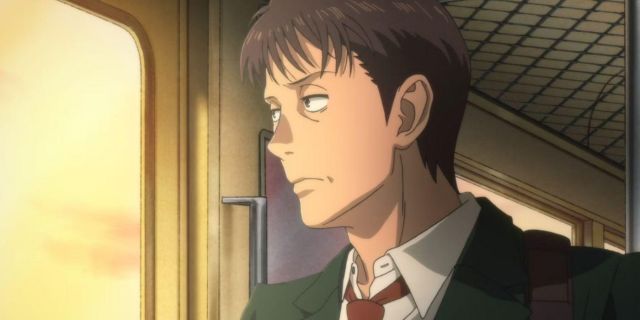The following contains spoilers for Episode 1 of My Home Hero, “From Today, I Am a Killer,” now streaming on Crunchyroll, as well as discussion of domestic abuse.
Spring 2023’s recently released seinen anime My Home Hero follows Tetsuo and Kasen Tosu as they do what they believe is necessary in protecting their domestically abused daughter and their own lives. The predominant plot point of this anime arises within the first episode, laying the groundwork for a multitude of consequences for one decision and how the characters will navigate them, making every moment significant.
When Tetsuo confronts Matori Nobuto, a member of the Yakuza, the exchange could be construed as an act of self-defense. In reality, it was predetermined murder fueled by the abuse toward his daughter Reika. Then, once Kasen finds Tetsuo with Nobuto’s corpse, the situation escalates by the decision to hide the body rather than go to the authorities. The moral question raised by Tetsuo’s decision is whether parental justice is justifiable or acceptable in place of executing the law. These complicated matters are rarely cut and dry, frequently littered with nuance and ambiguity. My Home Hero poses this question of morality — but leans heavily in one direction with its answer.
How My Home Hero Portrays the Act of Murder
The role of protagonist and antagonist in My Home Hero are acutely defined by the tone and actions of each character leading up to the altercation. Tetsuo is distraught from learning of the abuse his daughter has suffered, while Nobuto exclaims enjoyment in striking her as well as his intentions for their relationship. The latter’s actions are abhorrent, and the audience is rightfully compelled to despise him whilst feeling sympathy for Tetsuo’s lack of physical strength to directly confront his daughter’s abuser. However, this is an important factor in their altercation as Tetsuo is fully aware he cannot compete in strength. He is already preparing himself to commit the deed.
After Tetsuo ultimately wins in their clash, there is a crucial decision to be made. Whilst the moment is dark in its portrayal, there is no point where Tetsuo’s actions are shown to be wrong. His victory implies a rightful action, taking matters into his own hands to protect his daughter. It is an action that many with children could certainly imagine themselves doing should they be in the same situation; My Home Hero is aware of this by making Nobuto as dreadful as possible and having Tetsuo decide to land the final blow rather than accidentally killing Nobuto in a scuffle. It was emotionally driven murder, as portrayed by the color scheme of the screen being layered with red hue to imply Tetsuo seeing red.
My Home Hero Takes a Clear Stance on Parental Justice
Tetsuo’s wife Kasen’s inclusion in the cover-up only strengthens the view of morality. As the voice of reason, Kasen is immediate in her support and forward-thinking of how to progress. The importance of this fact is that there is no differing view on the murder to contrast Tetsuo’s decision. His wife, the one who would always speak the truth to him, behaves as if what he did is right. In the anime’s context, they are the protagonists to defeat evil — but there are consequences to it. Yet, this is not being foreshadowed as karma for their crime, but in the form of further obstacles that only increase the righteousness of the murder.
My Home Hero‘s blurring of moral lines is drilled into viewers’ straight from the first episode. Tetsuo and Kasen are not shown to be wrongdoers, and the gray area comes from people’s sense of morality in the real world rather than what is portrayed in the anime. Even through its name, My Home Hero is leading its audience to stand alongside Tetsuo and Kasen; it’s made into a fairly comfortable stance to take considering the character Tetsuo killed and the reason why he did it.















Leave a Reply